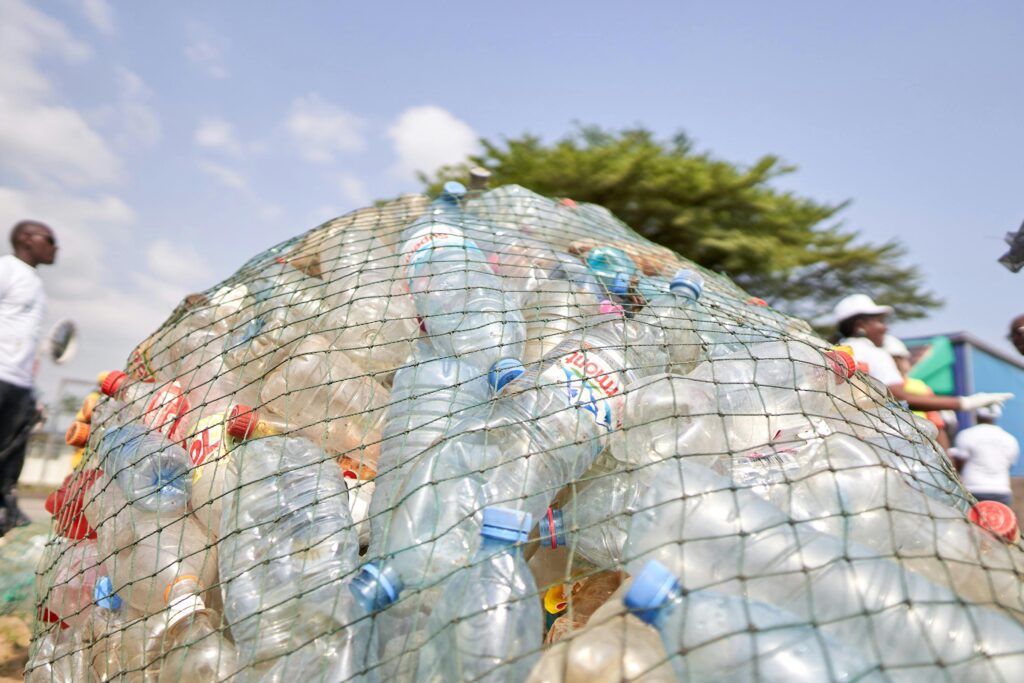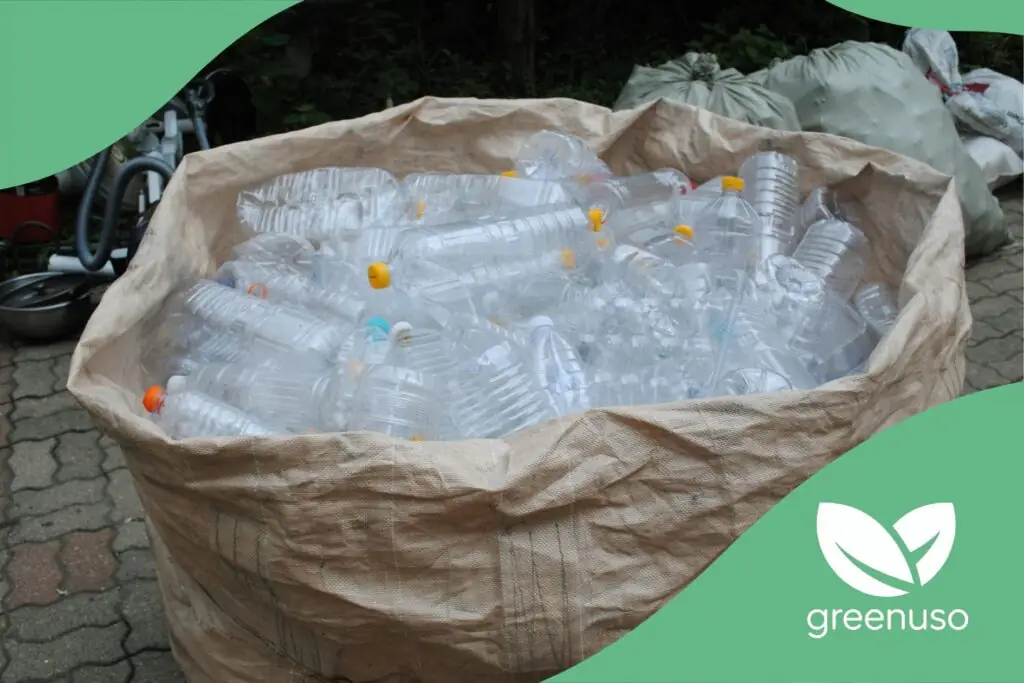The daily use of plastic bottles has an impact on the environment and collective well-being. Choosing sustainable alternatives helps reduce waste and promote more responsible consumption habits. Embracing eco-friendly solutions is a simple step towards a cleaner future.
Problems associated with the use of plastic bottles
1. Environmental impact of excessive use of plastic bottles
Plastic bottles are among the most common waste items in both urban and natural settings. Their lifespan is long – they can take hundreds of years to decompose, breaking down into microplastics that pollute soil, rivers, and oceans. This type of waste contributes to landfill overflow and places stress on waste management systems that are often not equipped to handle such volumes.
The production of plastic bottles requires vast amounts of non-renewable resources, such as oil and water. In addition, their transport and distribution generate extra CO₂ emissions, increasing their carbon footprint. This vicious cycle affects biodiversity – marine and land animals may ingest plastic fragments, compromising ecosystems and ultimately human food safety.
2. Logistical and economic challenges for businesses
The mass use of plastic bottles presents a range of challenges for businesses. Managing plastic waste can lead to rising costs for collection, recycling, and environmental fees. Dependence on plastic suppliers subject to oil price fluctuations increases procurement costs and affects budget stability.
Businesses must also adapt to increasingly strict regulations on single-use plastics. This creates pressure to invest in transitioning towards sustainable packaging, potentially disrupting supply chains. A lack of knowledge about available alternatives and the shortage of truly committed suppliers directly impacts planning and profit margins.
3. Resistance to change – personal and corporate
Switching to alternatives to plastic bottles is not always straightforward. On a personal level, ingrained habits can make it difficult to give up plastic – most consumers prioritise convenience and immediate availability. Misinformation or the perception of higher costs can lead to scepticism about sustainable choices.
In the business world, reluctance to alter established processes and uncertainty about how eco-products will be received by customers create further obstacles. Many companies worry that the shift might affect their profitability or brand position, especially in the absence of clear benchmarks and a fragmented supplier market. Overcoming this fear requires commitment and a strong willingness to align strategy with sustainability principles.

Aggravating factors of current challenges
1. Hidden costs of unsustainable practices
Maintaining plastic bottles as the primary solution involves a number of hidden indirect costs. Beyond the low upfront cost of plastic, there are expenses related to waste treatment – collection, storage, and management in landfills or recycling plants. Additional fines and fees may apply for non-compliance with increasingly strict environmental regulations. Over time, these costs can become a significant burden for both public institutions and private companies.
From an environmental perspective, the long-term effects of plastic pollution also increase social costs. Ecosystem contamination requires extra resources to clean up natural areas, and the impact on public health can generate medical expenses and indirect economic losses in sectors like biodiversity and tourism.
2. Shortage of suppliers with eco-conscious practices
Finding alternatives to plastic bottles largely depends on the availability of suppliers that develop materials and products based on sustainable criteria. The market still offers a limited range of truly eco-friendly solutions, which hinders the transition for companies and individuals seeking to reduce their environmental footprint.
The lack of clear standards and certifications to identify sustainable products makes supplier selection more difficult. Combined with limited large-scale availability or higher costs of certain alternatives, this slows down real adoption of sustainable packaging in industries such as hospitality, retail, and logistics.
3. Confusion and uncertainty in choosing alternatives
The variety of materials and suggestions for replacing plastic causes confusion among consumers and businesses. Common concerns include the actual sustainability of certain materials, packaging durability, food safety, and legal compliance.
This uncertainty is worsened by limited knowledge of production processes, certifications, and recyclability of options such as glass, stainless steel, cardboard, or plant-based compostable materials. Poorly informed decisions may lead to ineffective or even unsustainable choices in the long run, reinforcing the perception that switching away from plastic bottles is complex and risky.
Effective solutions: sustainable alternatives
1. Reusable and eco-friendly options instead of plastic bottles
The current market offers a range of alternatives to plastic bottles that reduce the use of single-use packaging and encourage more responsible consumption. Among the most appreciated options are:
- Stainless steel or aluminium bottles – reusable, durable, suitable for hot or cold drinks. They do not retain flavours and are easy to clean.
- Glass bottles – long-lasting, recyclable, and free from harmful chemicals. A safe option for transporting liquids and suitable for multiple uses.
- Biodegradable bottles – made from plant-based materials like corn starch or sugarcane. They break down naturally without leaving toxic residues.
- Reusable containers made from bamboo or food-grade silicone – lightweight, flexible, and practical for everyday use.
Choosing these alternatives helps reduce waste and limit the environmental impact of our daily consumption.
2. Tangible benefits of biodegradable products
Replacing plastic bottles with biodegradable or reusable products offers clear advantages for both the user and the environment:
- Significant waste reduction – biodegradable packaging breaks down in just a few months, avoiding landfill overflow and microplastic pollution.
- Medium- and long-term savings – reusable bottles may have a higher upfront cost, but pay off quickly by eliminating single-use purchases.
- Lower carbon footprint – recyclable or biodegradable materials require less energy to produce and process.
- Contribution to the circular economy – promoting reuse and recycling supports more responsible and sustainable production systems.
Tips for a successful transition to sustainable alternatives
Adopting alternatives to plastic bottles isn’t always immediate, but these steps can ease the transition:
- Choose certified options – select packaging with sustainability guarantees and suitable for food contact.
- Learn about the materials – understand the differences between glass, stainless steel, bioplastics, and bamboo to pick the best fit for your needs.
- Prioritise reuse – opt for durable, easy-to-clean products to maximise longevity. For example, use reusable cups for drinks on the go.
- Engage in environmental education – promote sustainable habits within your community and share knowledge about the benefits of reducing plastic use.
Implementing these measures effectively reduces our dependence on disposable plastics and supports a more mindful and sustainable consumption model.

